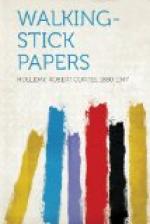Anybody returning from the Alps should bring back an Alpine stock with him; every one who has visited Ireland upon his return has presented some close friend with a blackthorn stick; nobody has made a walking tour of England without an ash stick. In London all adult males above the rank of costers carry “sticks”; in New York sticks are customary with many who would be ashamed to assume them did they live in the Middle West, where the infrequent sticks to be seen upon the city streets are in many cases the sign of transient mummers. And yet it is a curious fact that in communities where the stick is conspicuously absent from the streets it is commonly displayed in show-windows, in company with cheap suits and decidedly loud gloves. Another odd circumstance is this: trashy little canes hawked by sidewalk venders generally appear with the advent of toy balloons for sale on days of big parades.
In Jamaica, Long Island, the visitor would probably see canes in the hands only of prosperous coloured gentlemen. And than this fact probably nothing throws more light on the winning nature of the coloured race, and on the character and function of canes. In San Francisco—but the adequate story, the Sartor Resartus—the World as Canes, remains to be written.
This, of course, is the merest essay into this vast and significant subject.
I
THE FISH REPORTER
Men of genius, blown by the winds of chance, have been, now and then, mariners, bar-keeps, schoolmasters, soldiers, politicians, clergymen, and what not. And from these pursuits have they sucked the essence of yarns and in the setting of these activities found a flavour to stir and to charm hearts untold. Now, it is a thousand pities that no man of genius has ever been a fish reporter. Thus has the world lost great literary treasure, as it is highly probable that there is not under the sun any prospect so filled with the scents and colours of story as that presented by the commerce in fish.
Take whale oil. Take the funny old buildings on Front Street, out of paintings, I declare, by Howard Pyle, where the large merchants in whale oil are. Take salt fish. Do you know the oldest salt-fish house in America, down by Coenties Slip? Ah! you should. The ghost of old Long John Silver, I suspect, smokes an occasional pipe in that old place. And many are the times I’ve seen the slim shade of young Jim Hawkins come running out. Take Labrador cod for export to the Mediterranean lands or to Porto Rico via New York. Take herrings brought to this port from Iceland, from Holland, and from Scotland; mackerel from Ireland, from the Magdalen Islands, and from Cape Breton; crabmeat from Japan; fishballs from Scandinavia; sardines from Norway and from France; caviar from Russia; shrimp which comes from Florida, Mississippi, and Georgia, or salmon from Alaska, and Puget Sound, and the Columbia River.




